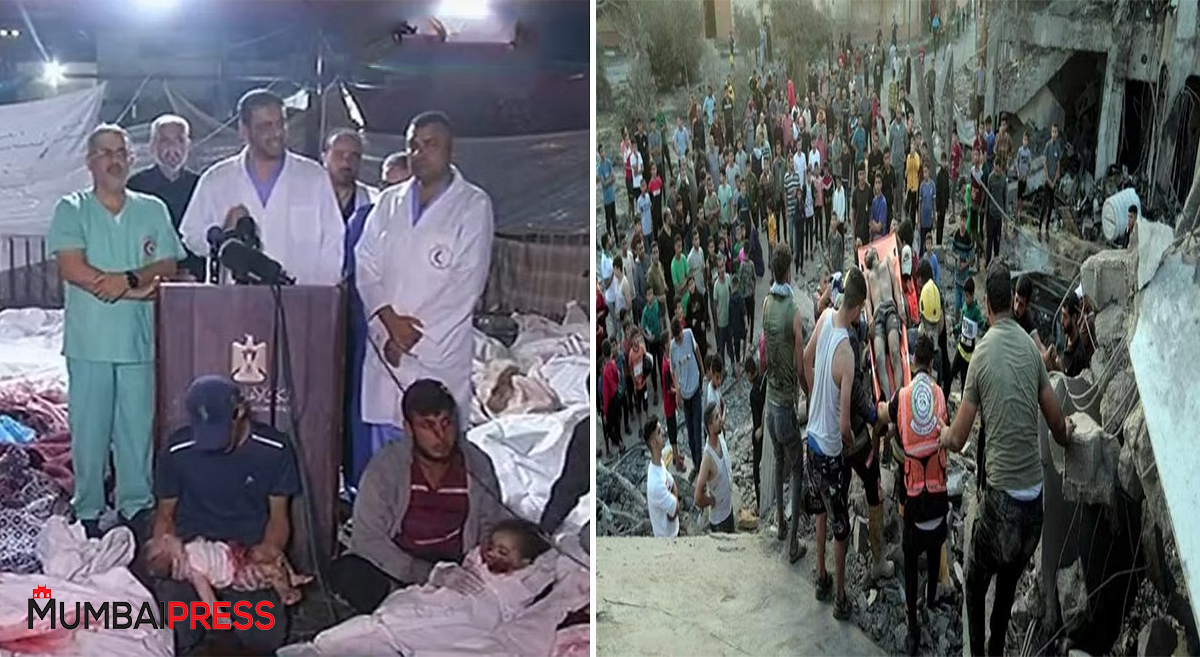Crime
Gaza Hospital Blast: Israel And Hamas Trade Blame, Share Videos As Explosion Kills Over 500 Including Children

A massive blast rocked a Gaza City hospital packed with wounded and other Palestinians seeking shelter Tuesday, killing hundreds of people, the Hamas-run Health Ministry said. Hamas blamed an Israeli airstrike, while the Israeli military blamed a rocket misfired by other Palestinian militants.
At least 500 people were killed, the ministry said.
As rage spread through the region because of the hospital carnage, and with US President Joe Biden heading to the Mideast in hopes of stopping the war from spreading, Jordan’s foreign minister said his country canceled a regional summit scheduled for Wednesday in Amman, where Biden was to meet with Jordan’s King Abdullah II, Palestinian President Mahmoud Abbas and Egyptian President Abdel Fattah el-Sissi.
War between Israel and Hamas pushing region to the brink
The war between Israel and Hamas was “pushing the region to the brink,” Foreign Minister Ayman Safadi told state-run television. He said Jordan would host the summit only when everyone had agreed its purpose would be to “stop the war, respect the humanity of the Palestinians and deliver the aid they deserve.” Biden will now visit only Israel, a White House official said.
The explosion at the al-Ahli Hospital left gruesome scenes. Video that The Associated Press confirmed was from the hospital showed fire engulfing the building and the hospital grounds strewn with torn bodies, many of them young children. The grass around them was strewn with blankets, school backpacks and other belongings.
Bloodshed and destruction
The bloodshed unfolded as the US tried to convince Israel to allow the delivery of supplies to desperate civilians, aid groups and hospitals in the tiny Gaza Strip, which has been under a complete siege since Hamas’ deadly rampage in southern Israel last week. Hundreds of thousands of increasingly desperate people were searching for bread and water.
Hamas called Tuesday’s hospital blast “a horrific massacre,” saying it was caused by an Israeli strike.
Israel Blames Islamic Jihad
The Israeli military blamed Islamic Jihad, a smaller, more radical Palestinian militant group that often works with Hamas. The military said Islamic Jihad militants had fired a barrage of rockets near the hospital and that “intelligence from multiple sources” indicated the group was responsible.
In a briefing with reporters, the chief army spokesman, Rear Adm. Daniel Hagari, said the army determined there were no air force, ground or naval attacks in the area at the time of the blast. He said radar detected outgoing rocket fire at the same moment, and intercepted communications between militant groups indicated that Islamic Jihad fired the rockets.
Hagari also shared aerial footage collected by a military drone that showed a blast that he said was inconsistent with Israeli weaponry. He said the explosion occurred in the building’s parking lot.
Since the war began, the military said in a statement that roughly 450 rockets fired at Israel by militant groups had landed in Gaza, “endangering and harming the lives of Gazan residents.” Islamic Jihad dismissed those claims, accusing Israel of “trying hard to evade responsibility for the brutal massacre it committed.” The group pointed to Israel’s order that Al-Ahli be evacuated and its previous bombing of the hospital complex as proof that the hospital was an Israeli target. It also said the scale of the explosion, the angle of the bomb’s fall and the extent of the destruction all pointed to Israel.
Palestinians had taken refuge in Al-Ahli and other hospitals in Gaza City in past few days
Hundreds of Palestinians had taken refuge in Al-Ahli and other hospitals in Gaza City in past days, hoping they would be spared bombardment after Israel ordered all residents of the city and surrounding areas to evacuate to the southern Gaza Strip.
Ambulances and private cars rushed some 350 casualties from the al-Ahli blast to Gaza City’s main hospital, al-Shifa, which was already overwhelmed with wounded from other strikes, said its director, Mohammed Abu Selmia. The wounded were laid onto bloody floors, screaming in pain.
“We need equipment, we need medicine, we need beds, we need anesthesia, we need everything,” Abu Selmia said. He warned that fuel for the hospital’s generators would run out within hours.
Israeli strikes on Gaza killed at least 2,778 people and wounded 9,700
Before the Al-Alhi Hospital deaths, Israeli strikes on Gaza killed at least 2,778 people and wounded 9,700, according to the Gaza Health Ministry. Nearly two-thirds of those killed were children, a ministry official said. Another 1,200 people across Gaza are believed to be buried under the rubble, alive or dead, health authorities said.
Hamas attack on Israel on October 7
Hamas’ October 7, attack in southern Israel killed more than 1,400 people, mostly civilians, and resulted in some 200 being taken captive into Gaza. Hamas militants in Gaza have launched rockets every day since, aiming at cities across Israel.
Hundreds of Palestinians flooded the streets of major West Bank cities including Ramallah, the seat of the Palestinian Authority, where protesters hurled stones at Palestinian security forces who fired back with stun grenades. Others threw stones at Israeli checkpoints, where soldiers killed one Palestinian, West Bank authorities said.
Elsewhere, hundreds of people joined protests that erupted in Beirut and Amman, where an angry crowd gathered outside the Israeli Embassy.
Abbas, whose Palestinian Authority exercises limited autonomy in parts of the occupied West Bank, had cancelled his participation in the summit earlier in the day to protest the hospital blast.
He blamed Israel for the destruction, calling it “a massacre that cannot be tolerated or allowed to pass without accountability.” With tens of thousands of troops massed along the border, Israel has been expected to launch a ground invasion into Gaza, but its plans remained uncertain.\
“Preparing for the next stages of war”
“We are preparing for the next stages of war,” military spokesman Lt. Col. Richard Hecht said. “We haven’t said what they will be. Everybody’s talking about a ground offensive. It might be something different.” Throughout the day Tuesday, airstrikes killed dozens of civilians and at least one senior Hamas figure in the southern half of the Gaza Strip, where the Israeli military told fleeing Palestinians to go. An Associated Press reporter saw around 50 bodies brought to Nasser Hospital after strikes in the southern city of Khan Younis.
The Israeli military said it was targeting Hamas hideouts, infrastructure and command centres.
An airstrike in Deir al Balah reduced a house to rubble, killing a man and 11 women and children inside and in a neighboring house, some of whom had evacuated from Gaza City. Witnesses said there was no warning before the strike.
Shelling from Israeli
Shelling from Israeli tanks hit a UN school in central Gaza where 4,000 Palestinians had taken refuge, killing six people and wounding dozens, the United Nations Palestinian refugee agency said. At least 24 U.N. installations have been hit the past week, killing at least 14 members of the agency’s staff.
A barrage of strikes crashed into the Bureij refugee camp in central Gaza, levelling an entire block of homes and causing dozens of casualties, residents said. Among those killed was one of Hamas’ top military commanders, Ayman Nofal, the group’s military wing said – the highest-profile militant known to have been killed in the war.
Gaza City: A sight of destruction
In Gaza City, Israeli airstrikes also hit the house of Hamas’ top political official, Ismail Haniyeh, killing at least 14 people. Haniyeh is based in Doha, Qatar, but his family lives in Gaza City. The Hamas media office did not immediately identify those killed.
Israeli Prime Minister Benjamin Netanyahu sought to put the blame on Hamas for Israel’s retaliatory attacks and the rising civilian casualties in Gaza. “Not only is it targeting and murdering civilians with unprecedented savagery, it’s hiding behind civilians,” he said.
With Israel barring entry of most water, fuel and food into Gaza since Hamas’ brutal attack, US Secretary of State Antony Blinken secured an agreement with Netanyahu to discuss creation of a mechanism for delivering aid to the territory’s 2.3 million people. US officials said the gain might appear modest, but stressed that it was a significant step forward.
Still, as of late Tuesday, there was no deal in place. A top Israeli official said his country was demanding guarantees that Hamas militants would not seize any aid deliveries. Tzahi Hanegbi, head of Israel’s National Security Council, suggested entry of aid also depended on the return of hostages held by Hamas.
Palestinians fleeing their homes
More than 1 million Palestinians have fled their homes – roughly half of Gaza’s population – and 60 per cent are now in the approximately 14-kilometre (8-mile) long area south of the evacuation zone, the UN said.
At the Rafah crossing, Gaza’s only connection to Egypt, truckloads of aid had been waiting to enter for more than a day. The World Food Program said that it had more than 300 tons of food waiting to cross into Gaza.
Crime
Mumbai: Govandi Resident Booked For Submitting Forged Birth Certificate With Passport Application Amid M-East Ward Scam Probe

Mumbai: Even as Deonar police continue their investigation into the alleged registration of 106 fake birth records in Mumbai Municipal Corporation’s M East Ward, another case involving a forged birth certificate has come to light. A separate offence has been registered against Govandi resident Fahed Abdul Salam Sheikh for allegedly submitting a fake birth certificate along with his passport application.
According to the FIR, Police Constable Vitthal Yashwant Bakle, who is attached to the passport verification cell at the Deonar police station, lodged the complaint. Sheikh’s passport application, dated June 3, 2025, was received at the police station on July 14, 2025. The applicant is a resident of Flat No. 2206, B Wing, Centrio Building, Waman Tukaram Patil Marg, Govandi.
As part of the verification process, Bakle visited the address mentioned in the application. On July 24, Sheikh personally appeared at the police station with his documents for verification. His birth certificate was subsequently sent for authenticity verification to the issuing authority the office of the Health Officer, Kalaburagi City Corporation, Jagat Circle, Main Road, Kalaburagi, Karnataka.
During a field inquiry conducted by the Deonar police in Kalaburagi, the Registrar of Births and Deaths, Kalaburagi Municipal Corporation, informed the police through a letter dated December 9 that no record of Sheikh’s birth certificate dated April 15, 1993 was found in official registers. This confirmed that the birth certificate submitted during passport verification was forged.
Based on these findings, the Deonar police have registered a case against Fahed Sheikh under relevant sections of the Bharatiya Nyaya Sanhita (BNS) Act, and the Passport Act, and further investigation is underway.
Crime
Mumbai: Ex-Hari Media Network Manager, Associates Booked For ₹1.41 Crore Scam Using Forged Athiya Shetty Signature

Mumbai: The Amboli police have booked three individuals for allegedly embezzling Rs 1.41 crore from Hari Media Network Private Limited through a series of fake projects and forged documents. The accused are Rishbh Sureka, a former senior manager–client servicing (influencer marketing) at the company, Yash Nagarkoti, CEO of Hooray Movies, and Ashay Shastri.
Sureka is accused of forging actress Athiya Shetty’s signature and creating a fake email ID in the name of actor Arshad Warsi to execute the fraud. Hari Media Network, which provides advertising and marketing services, has its head office in Haryana and a branch in Andheri West, Mumbai, opposite Yash Raj Films. Sureka joined in July 2023 and was authorised to handle influencer branding, project coordination, and communications with the finance team and CEO.
Soon after joining, Sureka received an interest-free loan of Rs 15 lakh from the company for his mother’s medical treatment. The fraud came to light through multiple fake invoices. In August 2024, Sureka claimed a Havells project featuring actress Dia Mirza required Rs31 lakh for Hooray Movies, which was approved. He allegedly told Nagarkoti the payment would be Rs 62 lakh.
After completion, Nagarkoti withheld the video and demanded the extra amount, citing a forged email from Sureka. The company paid an additional Rs 19 lakh to release the video. Investigations revealed Sureka, Nagarkoti, and Shastri conspired to submit forged bills in the names of brands like Havells, Mahindra Lifespaces, Realme Number Series, and Birla Estates. These fake claims totalled over Rs 52 lakh, transferred to Sureka’s personal account.
In January 2024, Sureka misused the company’s email to approach Matrix Entertainment, Athiya Shetty’s talent managers, and independently secured a Rs40 lakh advertisement with Khanna Jewellers. He forged Shetty’s signature on a fake agreement, collected Rs15 lakh from the jeweller, and did not pass it to Matrix. He also created a fake Zomato invoice involving Shetty and cricketer KL Rahul.
Crime
Amrapali Group case: ED attaches Rs 99 crore assets for duping homebuyers

Lucknow, Jan 3: In fresh action against real estate player, the Amrapali Group, the Enforcement Directorate (ED) provisionally attached immovable properties worth Rs 99.26 crore for fraudulently diverting and misappropriating homebuyers’ funds, an official said on Saturday.
The immovable properties attached under the provisions of the Prevention of Money Laundering Act (PMLA), 2002 include the office and factory land and building of Mauria Udyog Ltd., which is one of the entities of the Sureka Group, whose promoters are Navneet Sureka and Akhil Sureka.
The aggregate fair market value of the seized office and factory land and building was Rs. 99.26 crore as on December 30, 2016, the ED said in a statement.
The ED has now passed a total of six Provisional Attachment Orders, including the present one, under Section 5(1) of the PMLA, 2002, attaching properties having a cumulative value of Rs 303.08 crore.
The ED, Lucknow Zonal Office, initiated the investigation on the basis of multiple FIRs registered at different Police Stations in Gautam Buddha Nagar, Uttar Pradesh, and EOW, Delhi Police, and also pursuant to a Supreme Court order.
On July 23, 2019, the Supreme Court passed the order in Bikram Chatterji versus Union of India matter that was related to petitions filed by aggrieved homebuyers.
The allegations were that the Amrapali Group collected huge sums of money from homebuyers, failed to deliver possession of flats within the stipulated time, and fraudulently diverted and misappropriated the homebuyers’ funds by adopting a criminal conspiracy involving bogus transactions, forgery and cheating.
The ED investigation revealed that the accused persons, their associates and promoters — namely Anil Kumar Sharma, Shiv Priya and Ajay Kumar, Directors of the Amrapali Group — in connivance with Navneet Sureka and Akhil Sureka, Directors of Mauria Udyog and Jotindra Steel and Tubes Ltd, diverted homebuyers’ funds through non-genuine and fraudulent transactions under the guise of procurement of TMT bars and construction material.
The funds were layered through a complex web of shell entities and bogus suppliers, withdrawn substantially in cash and irreversibly dissipated, thereby generating and laundering the Proceeds of Crime (POC), the ED said.
It has been established that an amount of Rs110.39 crore was diverted to Mauria Udyog, representing POC generated from the money collected from Amrapali homebuyers.
As the original POC were dissipated and no longer available for direct attachment, the ED has attached the immovable properties of Mauria Udyog on the principle of “value thereof” under the PMLA, 2002, in order to secure the POC.
Earlier, the ED had arrested Anil Sharma, Shiv Priya and Ajay Kumar, Directors of the Amrapali Group; Anil Mittal, Statutory Auditor of the Amrapali Group; and Chander Prakash Wadhwa, CFO of the Amrapali Group.
So far, the ED has filed six Prosecution Complaints in this case, arraigning 33 individuals and entities as accused.
-

 Crime3 years ago
Crime3 years agoClass 10 student jumps to death in Jaipur
-

 Maharashtra1 year ago
Maharashtra1 year agoMumbai Local Train Update: Central Railway’s New Timetable Comes Into Effect; Check Full List Of Revised Timings & Stations
-

 Maharashtra1 year ago
Maharashtra1 year agoMumbai To Go Toll-Free Tonight! Maharashtra Govt Announces Complete Toll Waiver For Light Motor Vehicles At All 5 Entry Points Of City
-

 Maharashtra1 year ago
Maharashtra1 year agoFalse photo of Imtiaz Jaleel’s rally, exposing the fooling conspiracy
-

 National News1 year ago
National News1 year agoMinistry of Railways rolls out Special Drive 4.0 with focus on digitisation, cleanliness, inclusiveness and grievance redressal
-

 Maharashtra1 year ago
Maharashtra1 year agoMaharashtra Elections 2024: Mumbai Metro & BEST Services Extended Till Midnight On Voting Day
-

 National News1 year ago
National News1 year agoJ&K: 4 Jawans Killed, 28 Injured After Bus Carrying BSF Personnel For Poll Duty Falls Into Gorge In Budgam; Terrifying Visuals Surface
-

 Crime1 year ago
Crime1 year agoBaba Siddique Murder: Mumbai Police Unable To Get Lawrence Bishnoi Custody Due To Home Ministry Order, Says Report












